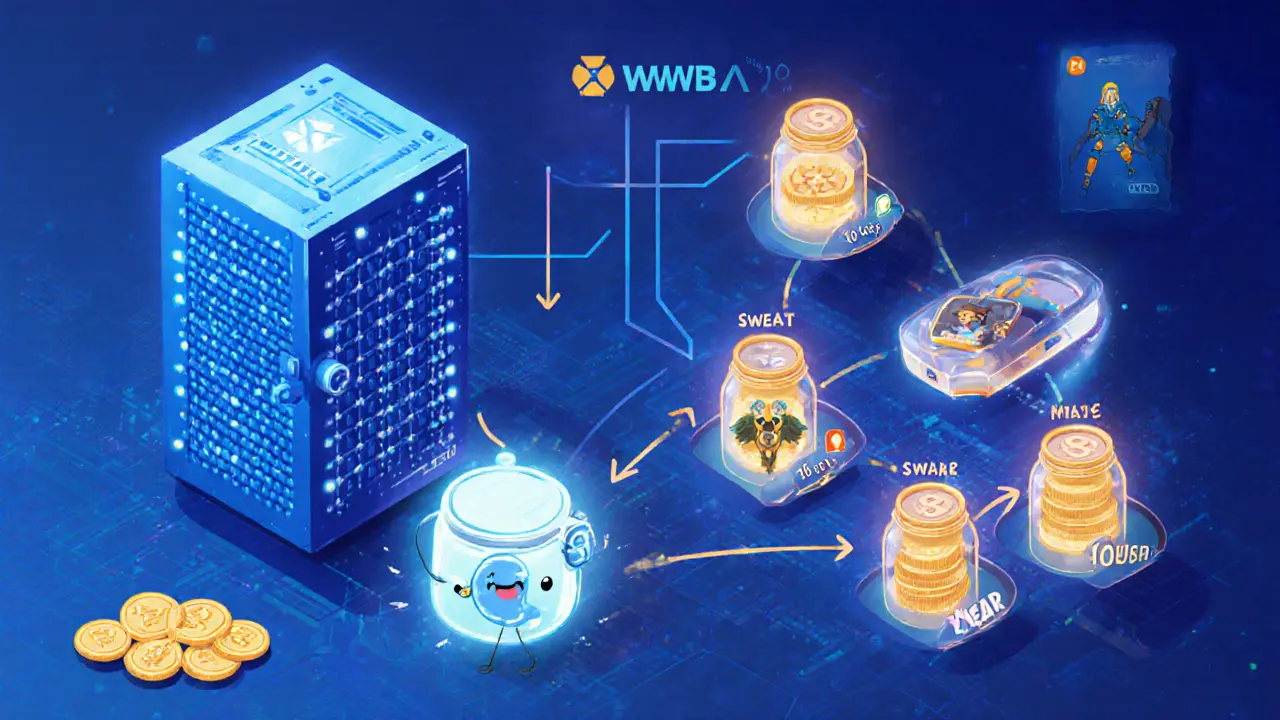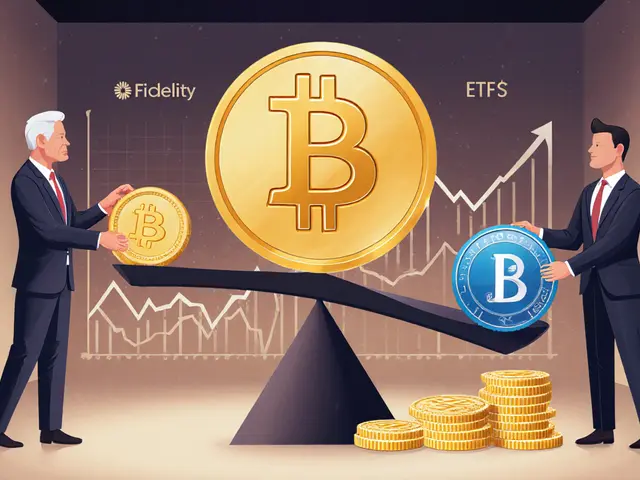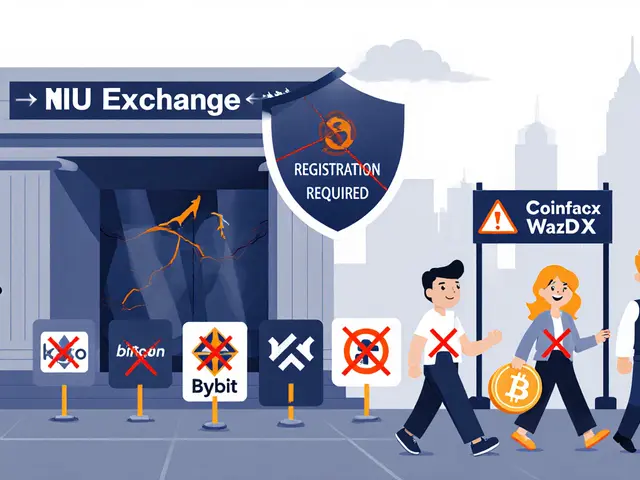SWEAT Token Value Estimator
Current SWEAT Token Info
Estimate Your SWEAT Value
Estimated Value
$0.00
Based on current price of $0.0022 per SWEAT
SWEAT vs Competitors
SWEAT is one of the leading Move-to-Earn tokens, but how does it compare?
| Token | Price (USD) | Max Supply | Blockchain |
|---|---|---|---|
| SWEAT | $0.0022 | 21.9B | Near |
| GMT (StepN) | $0.18 | 2B | Solana |
| FIT (FitCoin) | $0.005 | 10B | Polygon |
Ever wondered why your daily steps could turn into a digital asset? SWEAT token is the answer: a move‑to‑earn cryptocurrency that lets you earn real value simply by walking, running, or cycling. Built on the Near Protocol and backed by the massive Sweatcoin user base, SWEAT bridges the gap between fitness apps and Web3 finance. This guide breaks down what SWEAT is, how it works, its market performance, and what you need to know before you start earning.
How the SWEAT Token Works
At its core, SWEAT uses a concept called movement mining. Instead of solving cryptographic puzzles, the network rewards genuine physical activity. Here’s the flow:
- Install the Sweatcoin app and enable location tracking.
- The app records steps via proprietary validation algorithms that filter out shakes, bumps, and other fake movements.
- Verified steps generate Sweatcoins, the app’s native points, at a rate that decreases over time.
- When you’re ready, you can swap Sweatcoins for SWEAT tokens at a 1:1 ratio. Once converted, SWEAT becomes a transferable cryptocurrency on public exchanges.
This 1:1 conversion ensures that the value you earned in the Web2 app carries over to the Web3 ecosystem, making your activity truly monetizable.
Technical Foundations: Near Protocol and Tokenomics
The SWEAT token lives on the Near Protocol, a proof‑of‑stake blockchain known for fast finality and low fees. Near’s sharding architecture lets SWEAT handle high transaction volumes without the energy drain typical of proof‑of‑work chains.
Key tokenomics (as of October2025):
- Maximum supply: 21,867,346,500 SWEAT
- Circulating supply: ~7.2billion (≈33% of max)
- Current price: $0.0022USD per token
- Market cap: $19.3million
- Emission schedule: Minting rates decrease annually to encourage early adoption and limit inflation.
Because the supply is still expanding, early users who staked their tokens benefited from higher reward rates and lower transaction fees.
Ecosystem Features: Staking, Wallet, and NFTs
The Sweat Economy isn’t just a token; it’s a full‑stack platform with several utility layers.
Growth Jars are tiered staking contracts. Users lock SWEAT for a set period (30days to 2years) and earn additional SWEAT based on the jar’s reward multiplier. Higher tiers unlock perks such as premium app experiences, lower fees, and increased daily Sweatcoin minting limits.
The Sweat Wallet stores SWEAT and lets you buy the token directly with a credit or debit card. It also supports fiat on‑ramps, meaning you can convert earnings back to dollars without leaving the app.
Looking ahead, the team plans to launch NFT collectibles called Sweat Heroes. These NFTs will integrate with a gamified arena where users compete for extra SWEAT rewards, adding a Play‑to‑Earn layer on top of the Move‑to‑Earn core.

Market Performance and Outlook
When SWEAT debuted in 2022, it hit an all‑time high of $0.0919. By October2025, the price settled around $0.0022, a 97% drop. Trading volume remains healthy, with 24‑hour activity between $3.6million and $5.7million, indicating ongoing interest despite price volatility.
Factors shaping the outlook:
- Growth of the user base: Over 120million users across Web2 and Web3 platforms, making it the top health‑and‑fitness app in 58 countries.
- Deflationary pressure: Decreasing minting rates reduce new token supply, potentially supporting price if demand holds.
- Competitive landscape: New Move‑to‑Earn projects (e.g., StepN, FitCoin) are vying for attention, which could fragment the market.
- Regulatory uncertainty: Authorities are still deciding how to classify activity‑based tokens, which could affect exchange listings.
Analysts at Cryptohopper note that SWEAT’s real‑world utility-linking health outcomes to financial incentives-offers a unique value proposition that may sustain long‑term interest even if price swings continue.
How SWEAT Stacks Up Against Other Move‑to‑Earn Projects
| Token | Launch Year | Blockchain | Max Supply | Current Price (USD) | Unique Feature |
|---|---|---|---|---|---|
| SWEAT | 2022 | Near Protocol | 21.9B | $0.0022 | Movement mining tied to a 110M‑user app |
| GMT (StepN) | 2021 | Solana | 2B | $0.18 | GPS‑based outdoor activity rewards |
| FIT (FitCoin) | 2023 | Polygon | 10B | $0.005 | Multi‑sport validation (cycling, swimming) |
While SWEAT boasts the largest existing user base, its price is lower than many peers. The lower price can be a double‑edged sword: it makes entry cheap, but also reflects market skepticism about token economics.
Pros, Cons, and Risks
Pros
- Environmental friendliness - no energy‑hungry mining.
- Health incentive - users naturally become more active.
- Low entry barrier - anyone with a smartphone can start earning.
- Staking rewards via Growth Jars add a passive income layer.
Cons
- Token price has fallen dramatically since its peak.
- Minting rates decrease over time, reducing earnings for long‑term users.
- Regulatory gray area could affect exchange listings.
- Step‑tracking accuracy can vary by device and environment.
Risks
- Market volatility may erode the value of earned SWEAT.
- Platform changes (e.g., fee adjustments) could impact net earnings.
- Potential competition from new Move‑to‑Earn apps with more aggressive reward models.
Getting Started: A Quick Guide
If you’re ready to turn movement into money, follow these steps:
- Download the app: Search for “Sweatcoin” on iOS or Android stores.
- Set up your profile: Allow location access; the app uses GPS and accelerometer data to validate steps.
- Start walking: Every verified step adds Sweatcoins to your balance.
- Convert to SWEAT: Once you accumulate at least 1,000 Sweatcoins, open the “Swap” tab and exchange 1:1 for SWEAT tokens.
- Stake if you want: Transfer SWEAT to your Sweat Wallet, choose a Growth Jar tier, and lock the tokens for the desired period.
- Monitor market: Use a reputable exchange (e.g., Binance, Kraken) to watch price trends and decide when to sell or hold.
Pro tip: Pair your phone with a fitness tracker that reports steps to the app in real time. This can improve accuracy and boost daily earnings.

Frequently Asked Questions
What is the difference between Sweatcoins and SWEAT tokens?
Sweatcoins are in‑app points earned for steps; they stay inside the Sweatcoin ecosystem. SWEAT tokens are the blockchain‑based version you can trade on exchanges after swapping at a 1:1 rate.
Do I need a Near wallet to hold SWEAT?
No. The built‑in Sweat Wallet abstracts the Near blockchain, letting you store and stake SWEAT without managing private keys directly.
How are steps validated to prevent cheating?
The app uses a combination of GPS, accelerometer data, and proprietary algorithms that filter out sudden shakes, vehicle vibrations, and other non‑human motion.
Can I earn SWEAT without walking?
Currently, only step‑based activities generate Sweatcoins. Future updates aim to add cycling and swimming validators, which will also be convertible to SWEAT.
Is SWEAT considered a security?
Regulators have not provided definitive guidance yet. Its classification may differ by jurisdiction, so consult local laws before investing.
- Poplular Tags
- SWEAT token
- Sweat Economy
- Move-to-Earn
- Near Protocol
- Sweatcoin












People Comments
Walking into the crypto hype with a step‑by‑step drama, SWEET feels like the fitness world finally got a glittery blockchain makeover.
Although the exposition highlights potential utility, the token’s supply expansion and diminishing mint rates constitute a structural weakness that warrants critical scrutiny.
When you consider that each stride is being quantified as a tradable unit, you confront the paradox of turning an inherently free activity into a market commodity.
Nice summary! 👍 Keep moving and let those tokens pile up. 🌱
Price collapse shows it’s a joke.
The SWEAT token operates on the Near Protocol, a sharded proof‑of‑stake architecture that ostensibly mitigates latency and transaction cost concerns. Its tokenomics delineate a maximum supply of approximately 21.9 billion units, of which roughly 33 percent is currently circulating. The emission schedule incorporates a deceleration curve whereby yearly minting rates are reduced in a geometric progression, ostensibly to curb inflationary pressure. However, the linear reduction in step‑derived reward rates concurrently depresses the marginal utility for long‑term participants. From a macro‑economic perspective, the interplay between supply elasticity and demand elasticity must be modeled to assess price stability. Empirical data indicate that daily active users have plateaued, suggesting a saturation point in the addressable market. The platform’s growth jars introduce a layered staking mechanism that applies a multiplier to locked capital, yet this construct resembles a de‑facto yield‑generating instrument rather than a pure utility token. Moreover, the integration of fiat on‑ramps within the proprietary wallet abstracts blockchain custodianship, thereby re‑centralizing control. Regulatory ambiguity persists, as activity‑based tokens occupy a grey zone between utility and security classifications in multiple jurisdictions. Competitive analysis reveals that StepN’s GMT token maintains a higher price‑to‑utility ratio, leveraging GPS‑verified outdoor activity to justify premium valuation. FitCoin’s FIT token diversifies by accommodating multi‑sport validation, thereby expanding its user acquisition funnel. Consequently, SWEAT’s comparative advantage hinges on the sheer size of its pre‑existing user base, estimated at over 120 million. Nevertheless, user acquisition costs are escalating, and network effects may erode without substantive protocol upgrades. In sum, the token presents a compelling case study of the Move‑to‑Earn paradigm, yet investors should calibrate expectations against the backdrop of token dilution, regulatory risk, and competitive displacement. Prospective participants are advised to conduct rigorous due diligence, model token flow dynamics, and remain cognizant of the inherent volatility endemic to nascent blockchain ecosystems.
Thinking about SWEAT as more than a gimmick can really boost motivation; lock your tokens in a Growth Jar and watch the compounding effect, it’s like giving your daily jog a financial high‑five. 🚀💪
Alex, your deep‑dive unpacks the architecture brilliantly-especially the point about regulatory grey zones, which most casual readers overlook. For newcomers, remember that the step‑validation algorithm is the linchpin; any compromise there could destabilize the entire token economy.
From an American standpoint, it’s refreshing to see a home‑grown app turning ordinary walks into crypto gains, proving that innovation isn’t exclusive to Silicon Valley startups.
The SWEAT hype is nothing more than a polished marketing veneer masking a fundamentally flawed economic model that will inevitably implode.
Stay consistent with your steps and keep the Growth Jars topped up; over time the compound rewards will turn your commitment into tangible gains.
It's fascinating how the Move‑to‑Earn concept is being adopted across continents, blending local fitness cultures with global blockchain trends. 🌍
Cool stuff, definitely worth a look if you’re already using the Sweatcoin app.
The idea of turning each heartbeat into a shimmering token feels like poetry in motion-your daily promenade becomes a cascade of radiant digital fireflies. ✨
Honestly, if you’re not jumping on SWEAT now, you’re missing the biggest fitness‑crypto wave before it crashes.